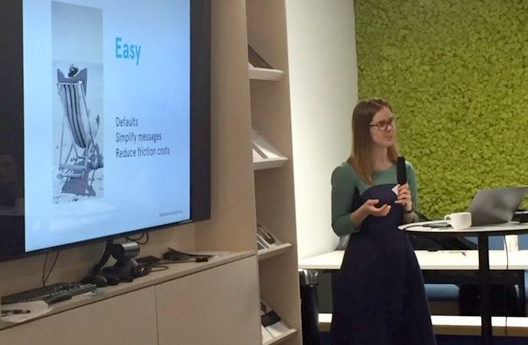Some of the earliest and most impressive applications of behavioural science focused on helping people to save for their retirement. In particular, there is the pioneering work of Brigitte Madrian, David Laibson, John Beshears and James Choi demonstrating the impact of automatically enrolling employees into workplace pension plans, and Richard Thaler and Shlomo Benartzi’s on the ‘Save More Tomorrow’ scheme, which provided an easy and effective way to ramp up pension contributions.
At the Behavioural Insights Team (BIT) we are currently reflecting on the successes of behavioural finance to date and considering how to apply these insights to day-to-day financial behaviours. This includes focusing on areas such as savings and credit choices, where there is huge scope for innovative approaches from policymakers and industry.
Innovation in this area is particularly important for helping many low to middle-income households in the UK. For many of these households, after paying essential expenses, there is often little to no disposable income each month. Despite being mostly in work, almost 70 per cent of these households have less than one month’s salary in savings and many have high levels of debt. As a result, these households are vulnerable to even modest changes in circumstances and to use Prime Minister Theresa May’s parlance, fall into the category of ‘just about managing’.
Two key issues for low to middle-income households are: how to better navigate the many credit card options on the market and how to build up a modest savings buffer to help deal with unanticipated expenses like a boiler breaking down or a car repair (without resorting to high-cost credit).
To better understand financial behaviours like these, this month BIT is launching the Financial Capability Lab in partnership with the Money Advice Service (MAS). The Lab has three main aims:
- Generate new ideas to address some of the most complex and difficult financial capability challenges facing people across the UK.
- Rapidly test these ideas, using qualitative methods led by Ipsos MORI and BIT’s new online experimentation platform called Predictiv.
- Recommend promising interventions that can be piloted and tested at scale in 2017/18.
The Financial Capability Lab forms part of the Money Advice Service’s broader Financial Capability Strategy, a ten-year plan which aims to deliver a step-change in how people in the UK manage their money. The Strategy has highlighted that there is a lack of reliable evidence around the most effective ways to make a real difference to people’s financial capability. MAS has since created a What Works Fund to help fill the evidence gaps identified. BIT’s partnership with MAS is part of the initial wave of What Works projects.
The Lab formally kicked off last week. We started by speaking with people in low and middle-income households about their financial situation and how they approach to money management. We also explored their barriers to paying off debt, how they go about saving and how these decisions impact their everyday lives.
Alongside this we have run a series of idea generation workshops with participants from government, regulators, charities, think tanks, the FinTech sector and academia. The workshop participants generated many innovative, behaviourally informed ideas to tackle the Lab’s first policy challenge: “How can we encourage working-age people who are ‘just about managing’ to build up a savings buffer to withstand financial shocks?” We are now selecting a number of the ideas to test early next year, focusing on those that have the potential to be high impact.
One of the most innovative and exciting aspects of the Lab is the use of Predictiv, an online tool developed by BIT to rapidly test and evaluate different ways of changing behaviour. We will use Predictiv to run online tests that measure how people respond to information presented to them and measure the key drivers that affect behaviour. For example, we might test the comprehension of different variations of information encouraging people to sign up for a savings product, or how consumer choices vary depending on how the cost of a credit card is framed.
When complete, the combined work of the Lab and the wider MAS What Works Fund will be among the largest and most in-depth programmes of work on financial capability ever conducted in the world. We hope that the ideas generated and tested through the Lab will make a significant contribution to improving the financial wellbeing of UK households. We look forward to sharing the results with you in 2017.
If you would like to know more about the Financial Capability Lab please contact elisabeth.costa@bi.team.
For more information about Predictiv, visit www.predictiv.co.uk or contact hello@predictiv.co.uk.

